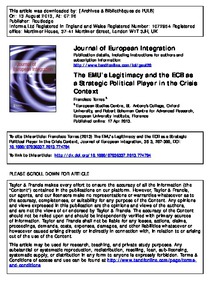The EMU's legitimacy and the ECB as a strategic political player in the crisis context

Journal of European Integration
2013
35
3
287-300
ECB ; EMU ; monetary policy
EMU and International monetary system
http://dx.doi.org/10.1080/07036337.2013.774784
English
Bibliogr.
"The sovereign debt crisis made it clear that, to be sustainable and serve its initial purpose (notably price stability), EMU would require enhanced policy coordination, increased sovereignty- and risk-sharing and further centralisation at the EU level of various competencies. In the crisis context, the ECB has emerged as an anchor of stability and confidence within a highly fragmented political system. It started to focus on the sustainability of EMU as its foremost objective, engaging in more active (and non-standard) policies and wider economic policy debates than otherwise required from a traditional central bank. This article departs from a gap in the literature with respect to the legitimacy of delegations to a supranational and independent institution like the ECB. It adopts an interdisciplinary view, bringing together various concepts (broad categories) of legitimacy and various types constraints that the common monetary authorities face. The framework is applied to examine the ECB's rationale to act strategically and its quest to legitimate its strategic political role through a renewed monetary dialogue with the EP. "
Digital
The ETUI is co-funded by the European Union. Views and opinions expressed are however those of the author(s) only and do not necessarily reflect those of the European Union or the ETUI.